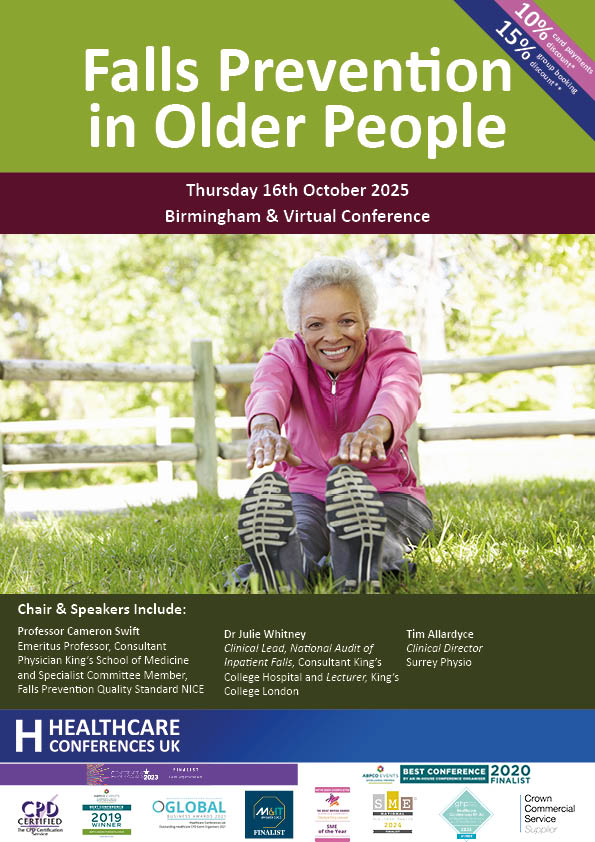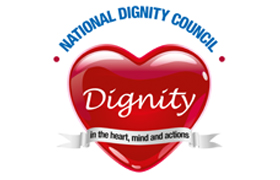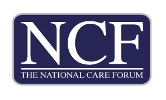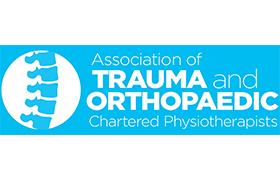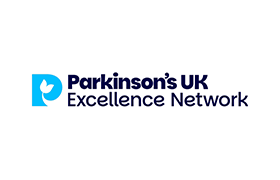Follow the conference on X #NHSFalls
This conference focuses on falls prevention and management in older people with a focus on ensuring effective and resilient falls prevention activity. The conference will update delegates on the April 2025 NICE Guidance update: Falls: assessment and prevention in older people and people 50 and over at higher risk, the World Guidelines for Falls Prevention and Management in Older Adults and highlight best practice through case studies. Sessions throughout the day will focus on activity and falls, developing and effective falls prevention programme, understanding human factors in falls prevention, improving falls education and awareness, effective personalised multidisciplinary assessment including the new MASA tool, falls and mental health including delirium prevention and managing the psychological impact of falling, medication management and improving secondary prevention. The conference will also discuss key elements in the reduction of falls in your service including strength, balance and exercise promotion, managing underlying health issues, developing personalized falls prevention care plans, and frailty presenting as falls. The conference will also update delegates on national requirements for falls investigation and learning under the Patient Safety Incident Response Framework (PSIRF).
“Falls can occur at any age but are increasingly common as people get older. Around a third of people aged 65 and over, and around half of people aged 80 and over fall at least once a year. In 2022/23 there were around 210,000 emergency hospital admissions in England related to falls for people aged 65 and over. Around 146,700 of these admissions were people aged 80 and over. Falls are the most common cause of fragility fractures and the consequences of fracture are significant, with between 18% and 33% dying one year after a hip fracture. The total annual cost of fragility fractures to the UK has been estimated at £4.4 billion which includes £1.1 billion for social care; hip fractures account for around £2 billion of this sum. ”
NICE 29th April 2025
“The world’s population is ageing. Falls and related injuries are increasingly common, making their prevention and management a critical global challenge. Many falls can be prevented.”
British Geriatric Society
“Around a third of adults over 65 will experience a fall each year, which can be devastating not just physically, but also for their confidence and independence.”
Minister of State for Care Stephen Kinnock 2025
Benefits of attending:
Network with colleagues who are working to improving falls prevention and management in older people
Reflect on national developments, national audits and the World Guidelines for Falls Prevention
Reflect on the April 2025 NICE Guideline update on Falls: assessment and prevention in older people and people 50 and over at higher risk
Develop competence in falls prevention and management
Improve your skills in the development of healthy ageing and effective strength and balance programmes
Examine how a human factors approach could support you to prevent falls
Understand the national requirements for falls investigation under PSIRF, and how findings from investigations can be used to inform falls prevention
Change the way you assess patients: Multifactorial assessment to optimise safe activity (MASA)
Understand how you can better meet the psychological needs of those who have fallen
Improve falls education and awareness in older people and support people to change behaviour
Identify and manage people at risk of falling, and effectively investigate and learn from falls when they do occur
Improve secondary prevention of falls and fractures
Learn from best practice in dementia, delirium prevention and falls
Update your knowledge on how effective medicines management can reduce falls
Self assess and reflect on your own practice
Supports CPD professional development and acts as revalidation evidence. This course provides 5 Hrs training for CPD subject to peer group approval for revalidation purposes


